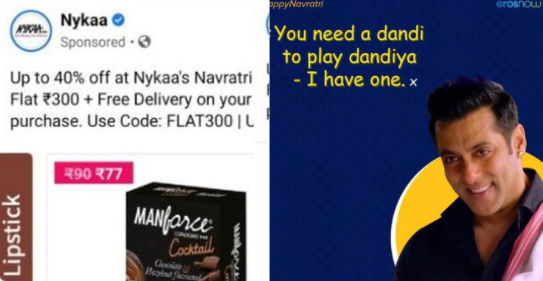Like every year, this time too, some liberal brands have come out to promote their products during Navratris – not by promoting bodily abstinence, but instead, shamelessly sexualising a Hindu religious festival. This year, cosmetics e-commerce site Nykaa has decided to offer as much as 40 per cent discount on condoms and lubes – because how else can a company like it celebrate a Hindu festival, if not by making monetary gains out of the perception that Navratri is, in fact, a pop festival and not a religious one to which Hindus attach great importance?
The screenshots of Nykaa’s offer were taken by activist Sunaina Holey and shared on Twitter. Nykaa was tagged and Sunaina asked what was the logic behind associating Navratri with sex. She said that Hindus celebrate this holy festival and nine goddesses are worshipped for nine days. She added, “Durga/Kali Puja is synonymous with Navaratri, wherein goddess Durga battles & emerges victorious over the buffalo demon Mahishasur to help restore dharma.”
Stop insulating Hindu Gods, Goddesses and festivals. Enough is enough @MyNykaa. You better stop advertising this condom ad under the name of Navratri. @LegalLro Pls look into the matter.
— Sunaina Holey ( Modi Ka Parivar ) (@SunainaHoley) October 8, 2021
Nykaa’s advertisement has triggered a flurry of responses on social media, and none of them seems to be in the company’s favour. For the past many years, there has been a concerted attempt to associate Navratri with sexual pleasure. Companies of various strands have tried to make profits out of selling condoms during these nine days, and most of their marketing strategy has revolved around lascivious, double innuendo adverts.
Repeat after me #BoycottNykaa@MyNykaa you don’t have any right to disrespect our festivals , beliefs and feelings, hoping that you would take down this type of malicious act and gather basic code of conduct and mannerism ! https://t.co/iyRq8qnuzz
— 🕉DAKSH SANATANI🇮🇳 (@DAKSHMA54853198) October 9, 2021
https://twitter.com/MahiSon9/status/1446769008523370497?s=20
On the contrary to this Navratri…. Bullshit, I belong to a family where my father sleep on mate for 9 days in same room while my mother uses bed.
I wish they had some sensitivity towards our values too. https://t.co/VGoWV1Lbed
— Khilesh (@CA_Khilesh) October 9, 2021
Idiots! They neither seem to know the festival nor its reverence nor marketing of their products. Most Hindus practice austere celibacy at this time. Thank goodness they didn't come out with mother's day offer or fathers day offers. Fools. https://t.co/d7NJz6kY87
— Heyo Critiq (@HeyoCritiq) October 9, 2021
Last year, Eros Now, which is a digital OTT platform owned by Eros International Media Ltd was lambasted on social media for its highly offensive, denigratory and outrageous posts, particularly on Twitter. Eros Now took to its Twitter handle to publish cheap posts, abound with sexual innuendo, while using references of Navratri and hashtags to the same effect as well. Owing to outrage on social media, Eros Now had issued an apology and taken down the posts.
Dear @krishikalulla and @ErosNow get ready to face legal music for insulting and hurting the sentiments of Hindus
Dont take us Hindus lightly warna dhandha band hojaayega ( legally ) share market mein seedha niche⬇️ samjhe
Shame on you perverts at Eros Music @HinduITCell pic.twitter.com/QdtPbIzbhp
— Ramesh Solanki (Modi Ka Parivar) 🇮🇳 (@Rajput_Ramesh) October 21, 2020
In 2018, an ad for a steroid supplement slyly indicated the occasion of Dandiya, a folk dance synonymous with Navratri, as being associated with erotic emotions. For those unaware, Dandiya Raas is a popular folk festival that originated in Gujarat, where devout disciples of Goddess Durga indulge in the festive dance, clashing dandiya sticks with each other, and trying their hands in the popular folk dance of Garba. Initially limited to Gujarat, Dandiya soon picked up name and fame and is now extremely popular worldwide for its enthusiasm, youthful spirit and the charm that follows this festival.
The advertisement in question, however, suggested that the Dandiya is not a vibrant folk fest that celebrates the spirit of Navratri, but a mere ‘meet fest’, where all the participants think of is to get ‘scored’. Such defamation of Dandiya and Navratris, though bizarre and atrocious, to say the least, is nothing unexpected. This is just another well thought, but poorly executed tactic to defame and shame anything even remotely related to Hinduism.
Read more: Navratri honours and celebrates women like no other festival in the world
According to a 2016 report by the Economic Times, condom manufacturers strategically ramp up supply and distribution with the beginning of Navratris. For instance, Durex, a Reckitt Benckiser brand, often releases new communication to coincide with the start of a season of festivals and holidays. Distribution is augmented and point of sale activations increase in what Durex calls “hot spots”, markets with a high concentration of younger people, colleges, and restaurants, cafés and bars.
Ranju K Mohan, director and business head, JK Ansell, makers of Kama Sutra condoms, believe tales of a dramatic rise in condoms sales during Navratri are more marketing myth than reality. In truth, it’s the beginning of a three-month-long season of festivals, holidays, and weddings that helps push sales up. Yet, Navratri is the only festival that is overtly associated with sex by ad makers. The ultimate goal, of course, is to besmirch Hindu festivals and to create a pop-vibe around them, so that a few years down the line, the youth begin seeing them not as days to spiritually awaken but to engage in sex alone.
However, brands are no longer being given a long leash to engage in brazen anti-Hindu propaganda. They are being brought to task on social media, which will eventually lead to them feeling wary of engaging in such theatrics ever again.
